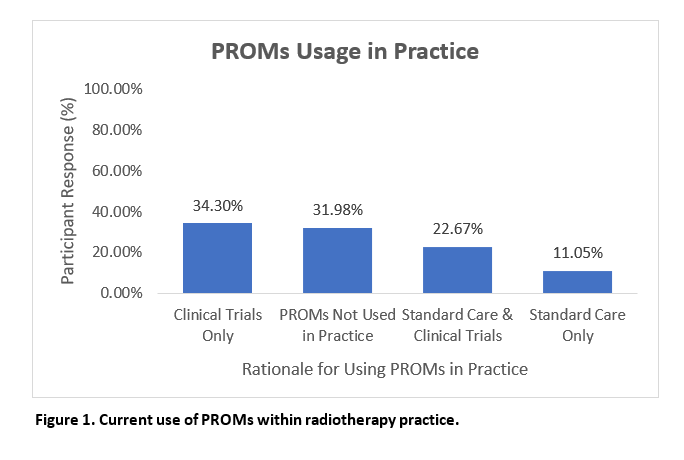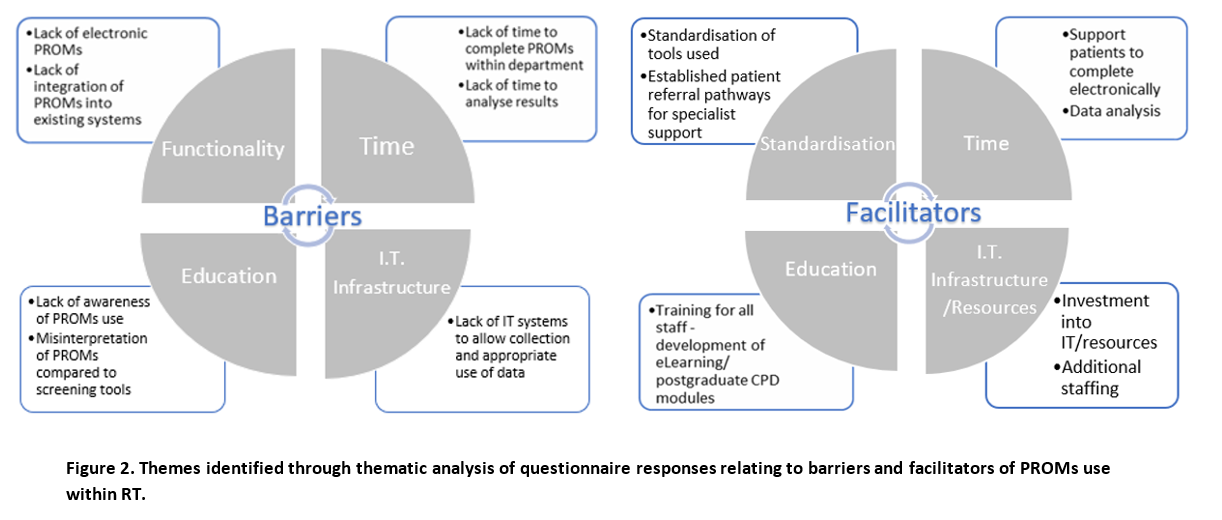A National Survey of Patient Reported Outcome Measures (PROMs) Use within Radiotherapy in England
Lauren Oliver,
United Kingdom
OC-0590
Abstract
A National Survey of Patient Reported Outcome Measures (PROMs) Use within Radiotherapy in England
Authors: Lauren Oliver1, Daniel Hutton2, Michelle Cain3, Michelle Bates4, Tom Hall5, Simon Evans6, Alison Bowman7, Anthea Cree8
1University of Liverpool, School of Health Sciences, Liverpool, United Kingdom; 2The Christie NHS Foundation Trust, North West Radiotherapy ODN, Manchester, United Kingdom; 3Clatterbridge Cancer Centre NHS Foundation Trust, Radiotherapy, Liverpool, United Kingdom; 4Norfolk and Norwich University Hospitals NHS Foundation Trust, East of England Radiotherapy ODN, Norwich, United Kingdom; 5The Christie NHS Foundation Trust, Clinical Networked Services, Manchester, United Kingdom; 6University College London, North, Central & East London Radiotherapy ODN , London, United Kingdom; 7Royal Free London NHS Foundation Trust, Oncology, London, United Kingdom; 8Clatterbridge Cancer Centre NHS Foundation Trust, Oncology, Liverpool, United Kingdom
Show Affiliations
Hide Affiliations
Purpose or Objective
Despite radiotherapy (RT)
providing effective cancer treatment, many patients develop acute and late
toxicities that significantly impact their quality of life (QOL). These are
often underreported by clinicians, thus a more robust assessment warrants the
use of patient reported outcome measures (PROMs). Advantages of PROMs include
stratified follow-up and evaluation of clinical effectiveness, safety, and cost.
The NHS England RT Service Specification
calls for routine use of PROMs,
however barriers exist at patient, healthcare professional (HCP) and service
levels. These include lack of time and training on the use and interpretation
of PROMs by HCPs, poor IT infrastructure and lack of integration of PROMs into
existing systems. Facilitators to PROMs use have been studied, including use of
electronic PROMs, automatic data interpretation and HCP training.
This study aimed to determine the
national use of PROMs within RT, to evaluate current attitudes, barriers and facilitators
to PROMs use within practice, and to develop practical recommendations to
implement PROMs within UK RT services.
Material and Methods
A questionnaire was developed consisting
of 12 multiple-choice questions relating to PROMs use. Free-text comment boxes were
provided to ascertain both qualitative and quantitative results. The questionnaire
was disseminated via email to all 11 RT Operational Delivery Networks (ODNs) across
England. 182 participants were recruited across a range of RT professions including
radiation therapists(RTTs), nurses and research staff. A mixed-methods approach
was adopted; thematic analysis of free-text responses provided qualitative
data, whilst descriptive statistics were used to analyse quantitative results.
Results
The current use of PROMs tools
and data was analysed. The majority of respondents indicated PROMs were used within
clinical trials only, whilst the second highest response indicated PROMs were
not used at all within RT (figure 1). The most common PROMs format observed was
completion of paper forms by patients. PROMs data were most commonly used to
assess patients or obtained as part of a clinical trial. Key themes relating to
the barriers and facilitators of PROMs use were derived from thematic analysis
of free-text comments (figure 2).


Conclusion
It is clear that PROMs are not
widely used within RT practice. Here, we provide recommendations to mitigate
the barriers identified and implement PROMs in RT. These include HCP training
on the appropriate use and value of PROMs and development/integration of
electronic systems. Standardisation of PROMs tools and storage of data in a
central repository would provide effective means of capturing RT toxicity data
nationally, informing future practice. In order to utilise PROMs results effectively
to improve patient QOL, referral pathways to existing specialist services must
first be established. This study provides a vital first step in driving the
implementation of PROMs within UK RT services.